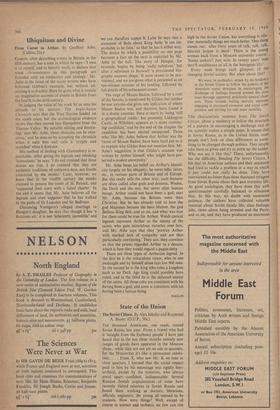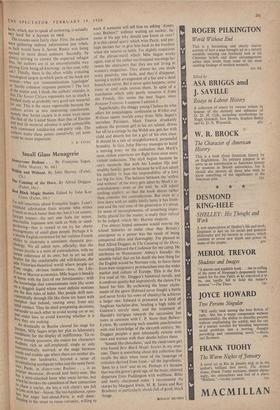State of the Union
TEN thousand Americans, one reads, toured Soviet Russia last year. From a friend who had it 'straight from the Embassy people' I have just heard that in the last three months entirely new ranges of goods have appeared in the Moscow shops : while they are not yet on sale in quantity, for the Muscovites it's like a permanent exhibi- tion. . . . From X, who saw Mr. K on tour at close quarters, I learned that the social respect paid to him by his entourage was rigidly hier- archical, except by the scientists, who always stood apart—confident, indispensable. Several Russian Jewish acquaintances of mine have recently visited relatives in Soviet Russia and found them working as doctors, librarians, officials, engineers; the young all seemed to be students. How were things? Well, except of course in science and technics, no Jew can rise
high in the Soviet Union, but everything is rela- tive; materially things are much better. 'One thing stands out : after forty years of talk, talk, talk, Marxist jargon is dead.' There is the young woman back from a Moscow university course: 'Status seekers? Just wait. In twenty years' time they'll outdistance us all in the bourgeois life.' Every week brings such glimpses of the changing Soviet society. But what about this?
We were, in particular, struck by the tendency in the Soviet Union to follow the pattern of the American social structure in encouraging the discharge of feelings focused around the class issue through approved, politically neutral chan- nels. These include feeling morally superior, engaging in increased economic and social com- petition and striving for still more mobility.
This characteristic sentence from The Soviet Citizen, about a tendency to follow the structure of a pattern in encouraging a discharge and so on, actually makes a simple point. It means that in Soviet Russia, as in the United States, most people don't look on class differences as some- thing to be changed through politics. They simplY take them as given and try to jostle up the ladder. Why not say it like this? There, unfortunately, lies the difficulty. Reading The Soviet Citizen, I felt that its American authors and their assistants had tried to tackle a problem in a way in which it just could not really be done. They have interviewed no fewer than three thousand refugees from Soviet Russia about their past everyday life. As good sociologists they have done this with questionnaires carefully balanced to eliminate bias. In this way, no doubt with enormous patience, the authors have collected valuable material about Soviet family life, class feelings, jobs, views about being arrested and the Party, and so on; and they have produced an enormous book, which, not to speak of reviewing, is actually very hard for a layman to read. The reasons seem fairly clear. First, the authors were gathering indirect information just when. as luck would have it, Soviet Russia was being opened to more direct contacts. Secondly, by always striving to correct the expected refugee bias, the authors are in an uncomfortable way Playing God, being all-knowing : in that case, why ask? Thirdly, there is the often wildly irritating sociological jargon in which parts of the book are written—what are 'communications typologies' Or 'family cohesion response patterns'? The fact of the matter and, I think, the authors' mistake, is that The Soviet Citizen represents not so much a finished study as probably very good raw material for one. This is the more regrettable because the authors arrive at two interesting conclusions,
like that Soviet society is in some ways more 'Ike that of the United States than that of Europe and that its material advance is quite compatible With continued totalitarian one-party rule. The authors make these points tentatively, yet none could be more important.
T. R. FYVEL







































 Previous page
Previous page